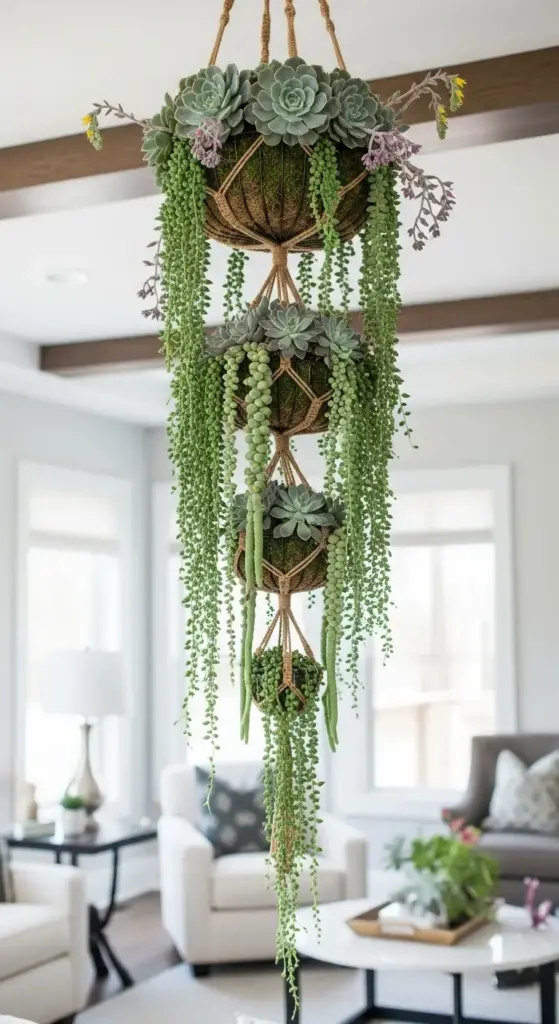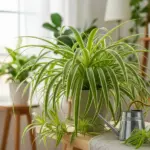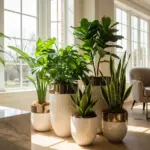3. The Cascading Succulent Chandelier Wall

Picture this: I’m scrolling through Instagram at 2 AM (as one does), and I see this absolutely stunning cascading succulent display that literally looks like a living chandelier hanging from someone’s ceiling. My jaw dropped.
I had to have one.
Fast forward two weeks and I’m standing in my living room surrounded by dead succulents and broken pottery. Turns out, hanging succulent gardens are trickier than they look on social media.
Creating Drama That Actually Survives
The secret to dramatic succulent displays isn’t just throwing plants in hanging baskets and hoping for the best. Trust me, I tried that approach.
Start with a sturdy macrame hanger or wire basket that can handle weight when wet. My first attempt used a cute but flimsy basket that crashed to the floor during watering.
Layer your vertical succulent arrangements with trailing varieties at the bottom and upright ones at the top. This creates that gorgeous waterfall effect everyone’s obsessing over.
Here’s what changed everything for me – use a lightweight potting mix specifically for succulents. Regular potting soil holds too much water and gets heavy.
Space your plants closer than you think. Succulents grow slowly, so that “full” look takes forever if you space them like regular plants.
Succulent Varieties That Won’t Disappoint
After killing probably $200 worth of succulents, I finally figured out which ones actually thrive in hanging garden setups.
String of Pearls is absolutely perfect for that cascading effect. Mine hangs down almost 3 feet now and looks incredible.
Burro’s Tail creates these amazing thick, trailing stems that add serious texture to your succulent wall art.
For upright drama, Echeveria varieties stay compact and add beautiful rosette shapes to the top of your arrangement.
Avoid jade plants in hanging displays – learned this one the hard way when mine got too heavy and broke the whole thing.
String of Hearts isn’t technically a succulent, but it works perfectly in these setups and adds a romantic touch.
Watering Without Creating a Disaster
This is where most people mess up their vertical succulent gardens, including me initially.
Water deeply but infrequently – about once every 10-14 days depending on your climate. I use a squeeze bottle to control exactly where the water goes.
The game-changer technique – water each plant individually rather than soaking the whole arrangement. This prevents root rot in the plants that don’t need as much water.
Take your hanging succulent display down for watering if possible. I learned this after creating puddles all over my hardwood floors multiple times.
Let excess water drain completely before hanging it back up. Succulents sitting in water is basically a death sentence.
Seasonal Care That Actually Works
Indoor succulent care changes with the seasons, even though they’re inside.
Winter means less water and more light. I move my cascading succulent arrangements closer to south-facing windows during the darker months.
Spring is propagation time. Those little babies that fall off can be rooted and added to expand your display.
Summer tip from my mistakes – watch for stretching if your succulents aren’t getting enough light. Leggy succulents ruin the whole aesthetic.
Fall is when I do major maintenance, removing dead leaves and repositioning plants that have grown awkwardly.
Styling for Different Room Vibes
The beauty of succulent chandelier walls is how versatile they are for different home decor styles.
For modern minimalist spaces, stick with green and silver varieties in clean white or black containers. The contrast is stunning.
Bohemian vibes call for colorful varieties in macrame hangers with natural wood accents. My boho friends go crazy for this look.
Industrial style works amazingly with succulents in metal wire baskets or repurposed colanders. The contrast between soft plants and hard metal is perfect.
For farmhouse aesthetics, use galvanized buckets or vintage-looking containers with trailing varieties spilling over the edges.
Propagation Magic
This is honestly my favorite part of succulent wall gardens – they basically make more plants for free.
Collect fallen leaves and let them dry for a few days before placing them on succulent soil. About 70% will root and create new plants.
String of Pearls propagation is ridiculously easy. Just lay a strand on soil and it’ll root along the stem.
Pro tip that saved me money – start with smaller, cheaper plants and let them grow into your display. Patience pays off big time here.
The vertical gardening trend with succulents isn’t going anywhere, and honestly, once you nail the watering schedule, these displays are practically maintenance-free.
Ready to turn your walls into an art gallery? Click below to discover how to create stunning living picture frame gardens that blend plants with traditional artwork – it’s like having a museum in your living room!









GIPHY App Key not set. Please check settings